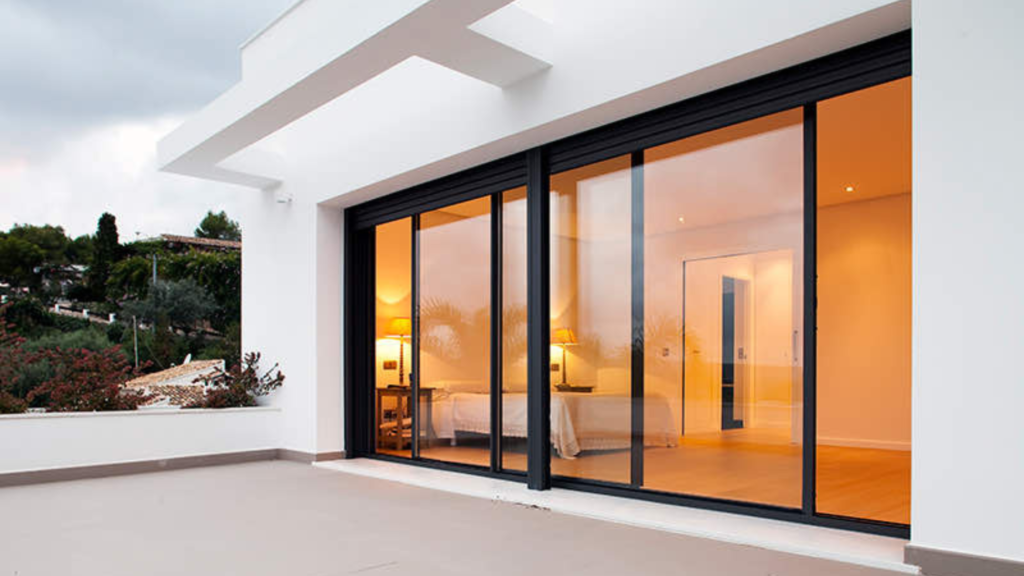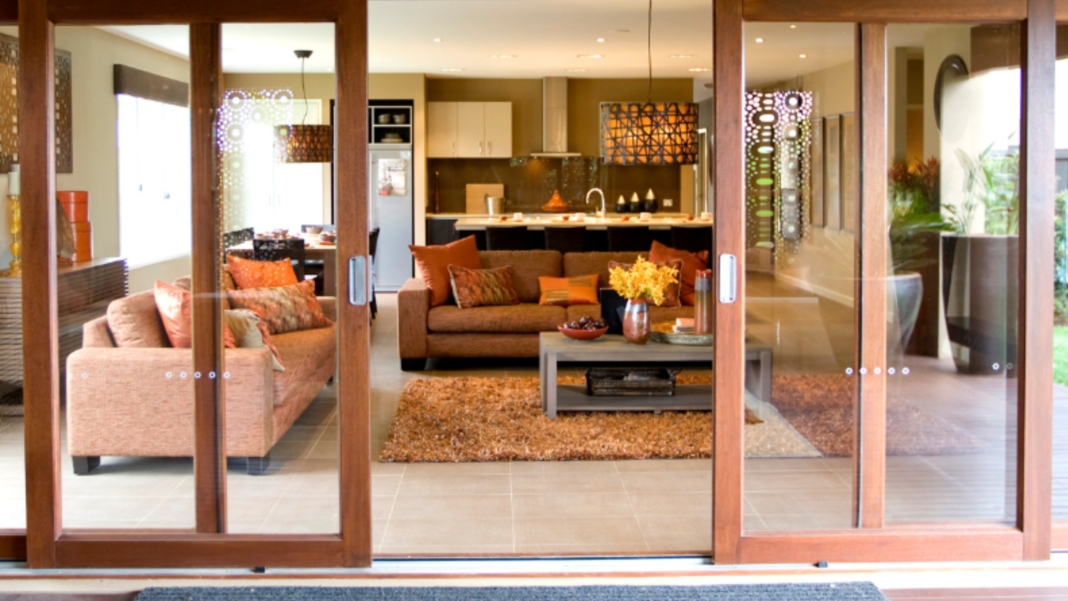Sliding door offer a sleek, contemporary answer to the house’s several architectural and design problems. These modest gateways are quite effective, whether your goal is to add a little bit of modern beauty, optimize ambient light and ideas, or conserve space. This comprehensive reference on sliding doors offers many advantages and ideas for homeowners, do-it-yourselfers, and interior designers.
Understanding Sliding Doors: More Than a Passage
Bypass doors, often referred to as sliding doors, are horizontally moving interior architectural elements that usually travel along an upper or lower track. Their increasing appeal stems from their practicality, capacity to save space, and the range of creative options they provide. Sliding doors are a smooth transition that may create a subtle division or unite areas while keeping the air feeling open.

A Digression into Contemporary Life
The open layouts that are popular now only sometimes work well with traditional swing doors. Modern living is made easier by sliding doors, which let areas blend harmoniously while offering seclusion when required.
Versatility of Design and Growth in Popularity
Sliding doors are becoming more than just room separators, as seen by their ability to blend in with various design motifs. They are now essential components of house plans, used in showers, pantries, closets, and other areas. They are both practical and fashionable because of their understated style, which lets other design elements take center stage.
The Advantages Exceed the Drawbacks
Beyond just looking good, sliding door installation may have many other benefits. For the modern homeowner, the entire value offer is important.
Conserving Space and Including Character
Sliding doors provide the immediate advantage of conserving space. Sliding doors provide a more efficient use of internal space since they don’t require the swing radius of conventional doors. They also make it possible to include striking design elements that a more traditional door system could make difficult.
A Livelier, More Luminous Environment
Particularly, sliding glass doors greatly improve the natural light entering a room and offer improved views of the outside world, giving homes the much-desired indoor-outdoor living experience. Sliding doors are an environmentally friendly option since they dramatically cut down on the amount of energy required for artificial lighting and heating due to their natural warmth.
Secrecy and Easily Accessed
Sliding doors provide your house with a genuinely delightful user experience as they glide silently open with a touch of your finger. This function is quite helpful for those who wish to guarantee movement around the house. Movement is an important factor for households of all ages.
The Sliding Spectrum: Types of Doors
Regarding sliding doors, there is no universally applicable solution. The material, design, and configuration selections significantly impact the usefulness of the door and the area it resides in.

Glass Sliding Doors: An Elegant Window
Sliding glass doors are renowned for their capacity to let the outside in and come in a variety of designs. While transparent designs provide a blend of seclusion and light, frameless versions allow an uninterrupted view and are ideal for spaces like walk-in closets and bathrooms.
The Coziness of Wood
Wood sliding doors have a timeless appeal and a natural warmth to them. Because of their exceptional insulating qualities, they are highly sought after and may bring great comfort to a home by controlling temperature and creating a cozy atmosphere.
Aluminum: Elegant and Sturdy
Aluminum sliding doors are distinguished by their strength and contemporary design. They are frequently used as exterior doorways because they are very weather-resistant and are available in a range of finishes, which makes it simple to match them to the color scheme of a house.
The Finest of Both Worlds with Panel Doors
Panel sliding doors combine the strength and elegance of aluminum with the beauty of wood via a unique material combination. They frequently have more panels, which offers plenty of flexibility for stacking configurations and total width.
Navigating the Doorway: Important Considerations
Selecting the ideal sliding door requires more consideration than just picking a finish. It entails being aware of the particular requirements of both the place and the users.
Size Counts
The sliding door’s dimensions and layout must match the available area before any purchases are made. Large doors may overpower a space, while tiny doors lessen the effect of their ability to save space.
Substance Matters
The major purpose of the door and the inside atmosphere should be considered while selecting the material. Interior rooms may prefer the cozy feel of wood or the lightness and openness of glass, but al fresco living areas benefit from aluminum’s durability.
Prioritize security
Security should also be considered when selecting sliding doors, which are typically bigger and more noticeable than regular ones. To ensure comprehensive house safety, look for features like numerous locking mechanisms and shatter-resistant glass.
Installation and Ongoing Care of Your Sliding Doors
Sliding doors installation might be an accurate and delicate process, but maintaining them thereafter is easy and satisfying for their flawless performance.
Precise installation is necessary to provide safe and level doors. Professionals are frequently involved in mitigating potential concerns like misalignment or irregular movement.
The doors must be properly lubricated, and the sliding tracks must be cleaned on a regular basis to avoid junk buildup and guarantee smooth operation year after year.
Discover how to recognize the warning signals of a malfunctioning sliding doors—sticking, falling, or rattling—and how to fix them quickly and frequently with easy fixes that can be performed at home.
Opening Up with Style: Sliding Door Design Ideas
You may use sliding doors as a blank canvas to express your creativity; there are many ways to use them in layouts and designs.
Maximize Natural Light: To bring in lots of natural light and create an air of openness in living rooms, think about installing wide glass sliding doors.
Creatively Divide Spaces: To divide areas while keeping the feeling of openness, such as bedrooms or home offices, use sliding doors made of tinted or frosted glass.
Smooth Indoor-Outdoor Transition: To create a smooth transition between indoor and outdoor living spaces, install sliding doors that open to patios or gardens.
Emphasize Design Elements: To ensure coherence and visual harmony, coordinate the sliding door’s frame material and style with the interior design scheme of your house.
Creative Closet Solutions: For closets and preservation, use sliding doors with wood panels or mirrors to provide utility and a clean, organized appearance.
Bold Color Selections: To give a splash of color and contrast to spaces with muted tones, use metal frames in striking hues.
The Search for the Right Fit: Purchasing Your Sliding Door
It may be challenging to sort through various designs, fabrics, and brands. Here’s how to make your shopping trip enjoyable:.
Brand Credo and Image
Investigating brands can provide information about quality, available warranties, and post-purchase customer support. Seek out businesses with a track record of positive evaluations and keep in mind their enduring principles and dependable products.
The Money and Its Significance
It would be easier to control your budget expectations if you knew price aspects, including material costs, distinctive designs, and cost-effectiveness enhancements. Recall that the lifetime of high-quality sliding doors and reduced maintenance requirements frequently make up for their initial greater cost.
Service and Warranty Contracts
Although the idea of sliding doors is relatively straightforward, their workings may be intricate. Give top priority to businesses that offer extensive warranties and dependable servicing assistance to ensure your money is safeguarded over time.
Frequently Asked Questions
How can I measure my home’s sliding door to ensure it is the proper size?
A: Measure the height, breadth, and depth of the area where you plan to put your sliding door to get the right size. Take into account any external and internal barriers that might interfere with the door’s functionality. Speak with an expert to ensure these measurements match industry standards or determine whether a particular solution is required.
Is it possible for sliding doors to save energy?
It is possible to design sliding doors to be energy-efficient. Seek outdoors with low-conductivity frames, weather stripping, and insulated glass. Thermally fractured metal is a particular case that combines strength and efficiency; otherwise, materials like wood and vinyl provide superior insulation as compared to standard aluminum frames.
Are doors that slide securely?
Today’s sliding doors have several locking points, strengthened glass, and the ability to add security bars or sensors, among other security measures. Choose doors that match or surpass local security requirements to provide your house with the most protection possible.
Can sliding doors be installed in an older home?
A: Unquestionably. Sliding doors may be added to newly constructed homes as well as existing ones undergoing repairs. An expert installer is the best person to determine whether adjusting the aperture or strengthening the structure is necessary for older homes to make room for the new door.
In Conclusion: The Ongoing Story of Your Sliding Door
In addition to being a practical feature, sliding doors add style and modernism to your house. They provide opportunities and let the outside in. Adding sliding doors may be a game-changer, whether you’re building from scratch or updating. Sliding doors are becoming more and more popular; driven by the need for open, light-filled rooms and a desire for environmentally friendly living, they are an essential component of well-thought-out, modern design.
Here is the previous article.


